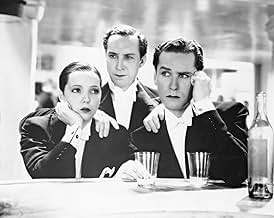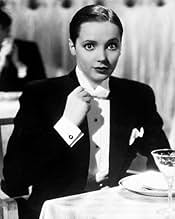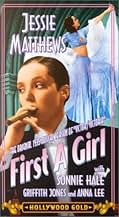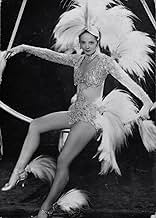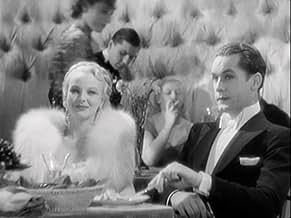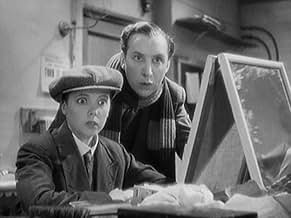Elizabeth dreams of being a music-hall singer. She gets to know Victor, that quite unexpectedly gets a female part in a music-hall number. He unfortunately finds himself voiceless, so, why w... Read allElizabeth dreams of being a music-hall singer. She gets to know Victor, that quite unexpectedly gets a female part in a music-hall number. He unfortunately finds himself voiceless, so, why wouldn't Elizabeth replace him in it?Elizabeth dreams of being a music-hall singer. She gets to know Victor, that quite unexpectedly gets a female part in a music-hall number. He unfortunately finds himself voiceless, so, why wouldn't Elizabeth replace him in it?
- Director
- Writers
- Stars
- Atlas
- (uncredited)
- Cast Member
- (uncredited)
- Cast Member
- (uncredited)
- Cast Member
- (uncredited)
- Man Serving in Cafe
- (uncredited)
- Reporter
- (uncredited)
- Director
- Writers
- All cast & crew
- Production, box office & more at IMDbPro
Featured reviews
Elizabeth (Jessie Matthews) is a British shop girl working in a fashion boutique that caters to the wealthy. She dreams of being a famous entertainer. One rainy day - while wearing the fancy clothes she is supposed to be delivering - she runs into Victor, aspiring Shakespearean actor and actual female impersonator who works the bawdy music halls of London. He is down to his last shilling when he gets a one-time engagement to work in one of these halls. Unfortunately, the rain has taken a toll on his voice and he is unable to take the job. Likewise, Elizabeth has ruined the clothes she was supposed to deliver and can't go back to her job. They forge an alliance for what is supposed to be a one-time thing - Elizabeth will go on as Victor and be a woman impersonating a man impersonating a woman so they both can collect the money they badly need. A high-class booking agent sees the act and offers the pair a chance to be the toast of Europe. A reluctant Elizabeth agrees since it does give her a chance at her dream.
The complications arise in France where a princess and her fiancé, which the princess treats more as a lapdog than a man, see her act. The fiancé arrives late to the performance and is at first attracted to Elizabeth, whom he believes is a woman performing as a woman. The princess enjoys telling him the joke is on him when she shows him the program that introduces Victoria - the great female impersonator.
The differences between this film and Victor/Victoria are that the princess sees her fiancé's attraction to "Bob" and yet wants to prove "Bob" to be a girl, opening up a pathway for a romance between the two, and also the princess starts a romance of sorts with Elizabeth's mentor, Victor. Thus the princess is not the jealous gun moll that Leslie Ann Warren plays in Victor/Victoria. Instead she is a Marie Antoinette-like character that seems to take nothing seriously. There are implausibilities in both films. In Victor/Victoria the film would lead you to believe that most of 1930's Paris is gay. In this film no trace of a gay lifestyle is ever mentioned. Instead Victor is supposed to be a straight man who lives in close quarters with the very attractive Elizabeth and apparently never has an impure thought or act. However, the rather unlikely pairing of Victor with the princess seems to be thrown in just so that the audience is assured of his straightness.
There are several very good Busby Berkeley-like musical numbers in the film as well as some very good and catchy tunes to go along with them.
Husband Sonnie Hale teams with Jessie Matthews to great effect, as Victor, the frustrated Shakespearian reduced to working the music halls as a female impersonator, bonds with 'Bill', the would-be song and dance girl who finds herself launched on an inadvertent male career after helping him out with his "Mr Victoria" act one night. As international success unexpectedly beckons, Victor persuades his reluctant new acquaintance to continue the masquerade with the promise that he will shield her constantly from exposure and will never let her down. And part of the charm of this film, as it skirts its way merrily along the censor's line without ever quite transgressing, is that they never do let each other down.
In a move that wrong-foots audience expectations, the odd couple duly fall inconveniently in love -- but not with each other. Predictable bickering and frustrations ensue, feet are put in it and bricks are dropped, and Victor's protective vigilance is sorely tested, but the two share the affectionate reliance of a true 'buddy movie' throughout, and it is this unquestioning trust that helps provide the film's warm-hearted appeal.
Despite its provocative subject matter, which resulted in severe cuts for American release (the constant focus on stratagems to conceal the heroine's true sex only serves to accentuate the issue of what is *not* being shown...), "First a Girl" has an oddly innocent generosity about it. It's one of those happy comedies that seems to take a genuinely sunny view of human nature, with disaster always foiled and characters revealing unexpected better selves. Nothing remotely titillating is ever actually disclosed, of course -- Victor's gallantly-turned back is our security for that -- but as in most cross-dressing cinema, one does have to tacitly presume a considerable degree of blindness on the part of the entire male cast if they can really confuse the girl in man's clothes for a boy, Eton crop or no Eton crop...
Jessie Matthews is, as ever, vivacious, talented and charismatic. As her co-star, Sonnie Hale comes near to stealing the show, with his open, likable persona and his cheerful willingness to be the butt of visual humour on screen, coupled with flashes of sincerity that make us care about the character as more than just a comic foil. Griffith Jones gives a fine performance yet again in the somewhat thankless role of handsome but secondary male lead (see also "Escape Me Never", "The Rake's Progress", "The Wicked Lady").
The dance numbers betray the somewhat cramped facilities available (the big production number at the end had to be filmed outdoors against a black night sky because there simply wasn't a sound stage big enough at the studio) and can feel somewhat gratuitously inserted -- I felt that the restaurant floor-show routine, in which Jessie Matthews doesn't even feature, outlasted its welcome in particular -- but the tunes stayed in my head for several days, and Miss Matthews performs with skill and an infectious gaiety that brings an unheralded smile to the viewer. "Evergreen" remains probably the best vehicle I've seen for her superb singing and dancing talents, coupling the comic potential of another masquerade scenario with more integrated musical performances and greater dramatic depth, but "First A Girl" still has great appeal.
Musicals in the 1930s were stiff mash-ups of song and dance numbers until the geometric fantasies of Busby Berkeley and then the narrative Fred Astaire movies, both in beginning in 1933 and 1934. This is a weird 1935 British affair that's well-enough filmed to remind you of Berkeley but is tepid by comparison. And as for plot, it takes awhile to get to that, following some decent and sometimes almost surreal dance/fashion scenes.
This is, in short, the original movie version of "Victor/Victoria." Once you get into the story, which will still be interrupted by old-fashioned feeling dance numbers, you'll get the cross-dressing stuff. All in fun. The leading woman (who does the switching, just as Julie Andrews did in the famous remake) is Jessie Matthews, who is a sort of Ginger Rogers type with a doll face. It's the doll face, highly feminine, that removes some of the credibility of the story--she does look slightly like a boy, when dressed as a man, but it doesn't quite carry. And of course, the point is to fool at least the other characters. The leading man Victor, played by Sonnie Hale, is also a problem, at least for audiences today, because he lacks charm, or sincerity, or pathos, or whatever might carry him through along with Matthews. He is meant to be the set-up for what "Victoria" has to do. But he's usually too dull for his own good, or he tries too hard. Matthews, at least, is purely charming and delightful. By the final number, however, when the tables are turned once again, Victor comes into his own. You might see it coming, but then it's divine.
It gives nothing away to say that the changing identities ruse is eventually suspected and the tension then begins. It's all done with a bit of stiffness, and filmed with uniform bright intensity, which makes it all a bit superficial, but is still enjoyable.
Did you know
- TriviaThe long scarf worn prominently by Sonnie Hale during the early scenes had been knitted for him by Jessie Matthews on the set of her previous film, Toujours vingt ans (1934).
- GoofsVictor, the expert in Shakespeare quotes "Is love a tender thing? it is too rough, Too rude, too boisterous, and it pricks like thorn. If love be rough with you, be rough with love" ending with "As You Like It" not the actual "Romeo and Juliet" from which the quote is taken.
- Quotes
Victor: [to 'Bill', about Princess Mironoff] She doesn't know you. Smile!
[Bill smiles awkwardly at the Princess, Victor does so with broad masculine appreciation]
Victor: [aside] Not like *that*. A he-man smile; she's beautiful!
[Bill catches sight of the handsome Robert and her smile widens]
Victor: [acidly] I said the Princess, not the Prince...
- ConnectionsFeatured in Sailing Along (1938)
Details
- Runtime1 hour 34 minutes
- Color
- Aspect ratio
- 1.37 : 1

